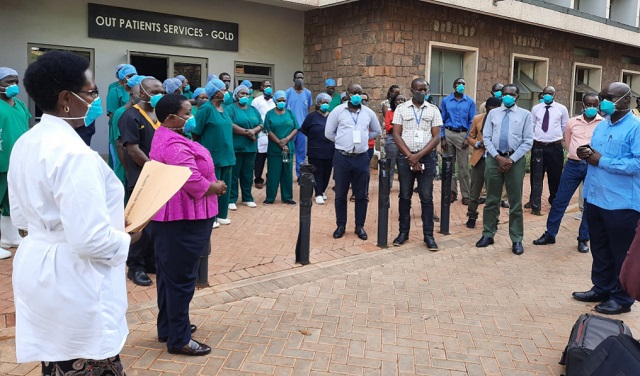
Survey shows Uganda response leading in Africa
Kampala, Uganda | THE INDEPENDENT | A study of the response of Sub-Saharan governments to the spread of the Corona virus disease COVID-19 sweeping across the globe has ranked Uganda higly.
The survey by GeoPoll which is the world’s largest mobile survey platform with a network of 200 million users in Africa and Asia was conducted in 12 countries between April 02 and 09. The study was run through SMS and mobile web, in which a web link is sent through a text message and opened in a basic browser.
Countries surveyed included Rwanda, Uganda, South Africa, Benin, Ghana, Kenya, Democratic Republic of Congo (DRC), Cote D’Ivoire, Nigeria, Tanzania, Zambia, and Mozambique.
Respondents in each country were asked to either strongly agree or disagree on a scale of 1-5 with the statement that: “My government has done enough to stop the spread of coronavirus. The Ugandan government scored highly at 4. Only Rwanda scored higher at 4.4 while Mozambique was third at 3.7.
According to the study, countries studied have taken a variety of actions to prevent the spread of coronavirus. As of April 13, Rwanda, Uganda, and South Africa were under nationwide lockdown measures, while Benin, Ghana, Kenya, DRC, Cote D’Ivoire, and Nigeria were under partial lockdowns in key areas. Tanzania, Zambia, and Mozambique had by this time still resisted calls for wide lockdown measures.
Generally, the rollout of these measures has been mixed, with reports of violence in countries including Kenya and South Africa as curfews and lockdowns are enforced.
But the study also found that in the countries studied, most respondent said they have taken some preventative measures against the virus’ spread. The majority stated that they are currently self-quarantining.
The study authors says they found that despite the difficulties that many will face due to quarantining measures, people are acting to stop the its spread because the danger of the disease has been made clear.
While the spread of COVID-19 is still in early stages in many of the countries studied, it is already having a large impact on economies, food security, and consumer behavior.
What people fear most
The mixed measures and messages contributed to a range of responses seen around government actions. Responses to the statement ‘My government has done enough to stop the spread of coronavirus’ varied widely among country and within countries, with respondents in some countries split between ‘strongly agree’ and ‘strongly disagree’.
The Democratic Republic of Congo and Zambia had the highest portion of respondents who strongly disagreed that their government was doing enough, at 32 and 31% respectively, although responses were quite split in DRC, with 51% strongly agreeing with the same statement.
Governments that were rated the highest on this measure were Rwanda, with 81% strongly agreeing that they had done enough to prevent coronavirus, and Mozambique, with 59% strongly agreeing. Countries where respondents were more split on this statement include Kenya, DRC, Nigeria, and Zambia.
Overall, females were more likely to agree that their countries were doing enough, with 52% of males and 58% of females giving agreeable scores. The middle age group, from ages 25-34, were less likely to strongly agree that their government was doing enough to prevent coronavirus’ spread than those younger and older.
The authors say their study demonstrates the high levels of fear around coronavirus and related impacts throughout sub-Saharan Africa.
Although many countries in Africa have only reported a small number of cases, there is a high level of fear surrounding the outbreak.
The level of concern is high across all countries, and majority also believes that they themselves are at risk of contracting the disease.
Up to with 72% overall reported that they are ‘very concerned’ over COVID-19. A slightly lower percentage overall, 63%, believe that they or their families are at risk of contracting the disease, with this percentage being lowest in Rwanda and Benin, and highest in Mozambique and Zambia.
The differences between perceptions of risk by country are likely due to the measures being taken by individual governments; Rwanda was the first nation in Africa to be placed on lockdown to prevent the virus’ spread, and was also successful at preventing the spread of Ebola in 2019, while as recently as April 7th Zambia’s government had rejected calls for a country-wide lockdown.
Food security and the economic impacts of the disease on economies that have already been struggling are at the top of mind for many people, aligning with warnings from experts that sub-Saharan Africa could experience high levels of food insecurity and its first recession in 25 years due to the virus.
The study found that populations are aware of the looming economic crisis, with 71% stating that they are very concerned about the economic effects of coronavirus. Concerns over the economic impacts are highest in Mozambique and Rwanda. Additionally, 26% listed economic impacts as their biggest concern of the outbreak, only slightly behind the 27% who state that contracting the disease themselves is their biggest concern.
Countries such as Uganda, South Africa, and Kenya were already experiencing weak economies before the coronavirus outbreak, and will be hit hard by the restrictions and trickle-down effects related to COVID-19. The economic effects of COVID-19 will be felt even harder in these emerging economies due to their reliance on informal trade and exports of commodities that are falling in value.
 The Independent Uganda: You get the Truth we Pay the Price
The Independent Uganda: You get the Truth we Pay the Price


